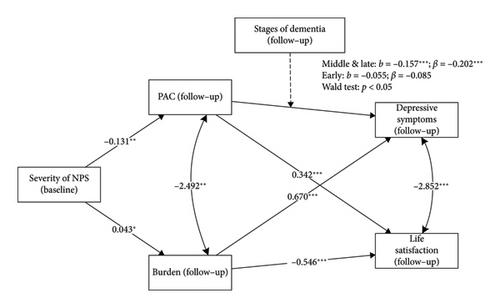Stressors, Positive and Negative Caregiving Appraisals, and Caregiver Psychological Well-Being: The Moderating Role of Stages of Dementia
Abstract
Caregiving is a process affected by both caregiver and care recipients and contains both positive and negative experiences. However, there is a lack of theories that capture the impact of the progression of dementia on family caregiving. This study proposed and examined a dementia caregiver process two-factor (DCPT) model. Specifically, we explored (a) the relationship between the severity of caregiving stressors and caregiver psychological well-being, along with the mediating role of positive aspects of caregiving (PAC) and caregiving burden, and (b) the moderating role of stages of dementia. Data were obtained from a two-wave longitudinal data collected from 328 adult–child dementia caregivers in Hong Kong. Multiple group analysis was used to examine the proposed hypotheses. Results show that PAC and burden both significantly mediated the relationship between care recipients’ neuropsychiatric symptoms (NPS) and caregiver depressive symptoms and life satisfaction. Stages of dementia significantly moderated the relationship between PAC and caregiver depressive symptoms, with PAC associated with lesser depressive symptoms only among caregivers of those with middle- or late-stage dementia. In sum, the dementia caregiver process two-factor model proposed in this study was supported by our empirical data. This theory and the study results underscore the importance of both PAC and burden and capture the specificity of the caregiving process in different dementia stages. Findings in this study suggest the need to develop tailored interventions that can better accommodate caregivers with diverse characteristics and adapt to the entire disease trajectory.


 求助内容:
求助内容: 应助结果提醒方式:
应助结果提醒方式:


